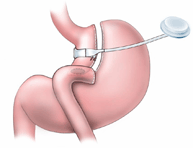Guide to Laparoscopic Gastric Banding
Reviewed by the physicians of Columbia’s Weight Loss Surgery Team, February 2024
 Adjustable gastric banding (also known as “Lap Band” or “Realize band”) is considered by many to be the least invasive surgery for weight loss. The procedure involves placing an implant, a soft silicone ring with an expandable balloon in the center, around the top part of the stomach. It effectively creates a two-compartment stomach, with a much smaller top part above the band. A person eats enough food only to fill the top part of the stomach. Over time, after the meal, the food passes through the opening of the band into the remainder of the stomach, and digestion occurs normally.
Adjustable gastric banding (also known as “Lap Band” or “Realize band”) is considered by many to be the least invasive surgery for weight loss. The procedure involves placing an implant, a soft silicone ring with an expandable balloon in the center, around the top part of the stomach. It effectively creates a two-compartment stomach, with a much smaller top part above the band. A person eats enough food only to fill the top part of the stomach. Over time, after the meal, the food passes through the opening of the band into the remainder of the stomach, and digestion occurs normally.
The band is attached to an injection port under the skin via a soft tubing, which allows adjustment of the band’s tightness by inflating or deflating the balloon in the band. Adjustments to the band are easily performed in the office and require no special preparation. Adding saline to the band makes the orifice between the two parts of the stomach smaller, making the passage of food from the top of the stomach to the rest of the stomach slower. Removing saline from the band allows more rapid passage of larger particles of food to pass.
The adjustable gastric band procedure was first approved by the FDA for use in this country in 2001, however, it is rarely performed in contemporary bariatric practices, declining from 24 percent of all bariatric procedures in 2003 to 0.9 percent in 2019. The decline may be due to its relatively modest amount of expected weight loss, coupled with high rates of revision and weight regain. It has been gradually replaced by other bariatric surgical procedures, especially sleeve gastrectomy, which offers better results for weight loss and comorbidity resolution.
Although short-term complications of surgery are very rare, recent evidence suggests a significant long-term complication rate. Between 15 and 60% of patients need re-operation for implant malposition, erosion, frequent vomiting, or weight loss failure.
Stories & Perspectives
In Their Own Words: Patients Describe Their Transformations
Next Steps
Ready for a change? To get started with our program, call (212) 305-4000 or request an appointment online today.
Related Topics
- Sleeve Gastrectomy
- Gastric Bypass Surgery
- Revisional Surgery
- Duodenal Switch
- Endoscopic Procedures
- Gastric Balloons
- Metabolic Analysis
- Adolescent Weight Loss Surgery
This content has been created by Columbia’s Health Guide Team. Learn more about our efforts to bring you the clearest, most accurate, and most human health resources available.
